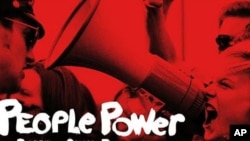Popular social media, such as Facebook and Twitter, were instrumental in organizing the non-violent protests that led to the resignation last month of Egyptian President Hosni Mubarak. Some people in Egypt and other parts of the world have also been using other media for ideas on how to remove a dictator. This includes watching TV documentaries on civil disobedience created by a private video company in Washington. The company has also produced video games on ways to use non-violent tactics to enact change.
The York-Zimmerman TV and film company in Washington has produced several documentaries on civil disobedience. Filmmaker Steve York says they have been shown around the world and translated into a number of languages, including Arabic.
"People were using these films as training devices in their own non-violent movements, in their struggles against dictators, or authoritarian or oppressive regimes," he said.
York says one of the most popular films is one called "Bringing Down a Dictator." It documents the non-violent strategies used against former Yugoslavian President Slobodan Milosevic, who resigned after disputed election results in 2000. He was later arrested and tried for war crimes in The Hague, but died before the proceedings finished.
Ivan Marovic, who is in York’s film, was a leader in OTPOR, the primary non-violent movement against Milosevic. He was a university student who organized demonstrations.
York-Zimmerman hired Marovic to help create video games - that show non-violent strategies to help remove oppressive governments. The second, and most recent game is "People Power - The Game of Civil Resistance." It contains fictional scenarios in which the leader of a non-violent movement uses tactics such as street protests, strikes and boycotts. Speaking from Belgrade, Serbia, Marovic said people who play the game are likely to be young and educated.
"The game allows you to see all the complexities of a political struggle, and to kind of focus on all the nuances, and all the details that are necessary, in order to make the right move," he said.
York says the video games are the first of their kind.
"It became apparent to us, that people who are engaged in non-violent struggles in places in many countries around the world, simply didn’t have materials that would help them learn the techniques," he said.
Jack Duvall, president of the International Center on Non-Violent Conflict in Washington, says the game is also being used in universities.
"Hundreds of political scientists, sociologists, and others at the undergraduate and graduate level have actually embedded the use of these games in their normal curriculum," he said.
The "People Power" video game can only be downloaded from the internet. It costs $10, but York says people can get it for free if they cannot afford to pay for it. He says it has been downloaded in many places.
"Latin America, Eastern Europe, parts of Asia, certainly Africa and the Middle East," he said.
"People Power" is currently available only in English. But York says it will soon also be available in Arabic, Farsi, Russian and Spanish.




